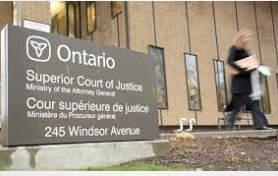SUDBURY—Next week, the Ontario Superior Court will hear a precedent-setting case involving 10 First Nations defendants facing cannabis-related charges dating back to the early days of the legalization of recreational cannabis. Ontario made the substance legal on October 17, 2018. The caveat on the legalization was that permits from the Ontario provincial government must be filed for and granted to business owners. The constitutional challenge initiated nearly four years ago has faced delays in reaching trial, with the pandemic and a general backlog contributing to the prolonged process.
All 10 defendants logged into a virtual trial of the Superior Court of Justice on Monday, January 15. Nine of the 10 who stand accused owned or worked at a cannabis dispensary on a First Nation without the required license or approval from the Chief and council. Though the 10 defendants belong to different communities, their cases have been parcelled as they demand that the charges violate their traditional rights to trade cannabis as a means of economic development. The communities they belong to are Wahnapitae, Henvey Inlet and Garden River First Nations, and their lawyer, Michael Swinwood, represents them.
Advocates argue that the Wahnapitae First Nation stores should be permitted to operate, asserting that the police and the Ontario government should not exercise jurisdiction on their land. Ted Roque, a band councillor from Wahnapitae First Nation, expressed dissatisfaction with the situation, stating, “This should not have happened. We have our own laws within our community, and we’ve been collaborating with local dispensaries, drafting our own bylaws and regulations and seeking respect for them. Unfortunately, we observe that this respect is lacking. We assert our own jurisdiction over this matter, and the province should not be involved.”
Mr. Swinwood is legal counsel for the Nation of Amikwa Nipissing Allies (NANA) and a member of NANA Leadership Counsel. NANA filed a Statement of Claim in the Ontario Superior Court in November of 2023 for recognition as an Indigenous Nation under Section 35.1 of the Constitution. Mr. Swinwood will argue that all ten defendants in the cannabis case can trace their genealogy back to the Indigenous Nation that was first recorded by Samuel De Champlain in the late 1600s and the Codex Canadensis in 1700. The Amikwa Algonquins were last recorded in colonial documents in 1701. However, those who claim lineal descent say that when the Treaty of Paris was signed in 1774, the nation who had fought alongside the French in the seven years of war was excluded from receiving reservation lands and that they dispersed among the First Nations of Manitoulin Island and the North Shore of Lake Huron.
The case could be made that the Robinson-Huron and Robinson-Superior treaties aren’t truly legal, as the First Peoples who signed had migrated into the territory due to the US Indian Removal Act of 1830, as was written in correspondence by D.B. Papineau, who was the joint premier of the province of Canada and Commissioner of Crown lands just before the signing of the Treaties.
Source: https://www.pentictonherald.ca/spare_news/article_892efba6-3efe-58c7-84ac-6210dcb5ba27.html




















